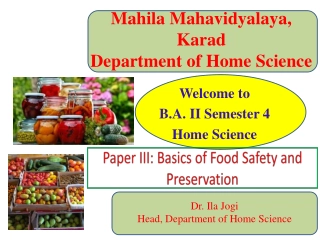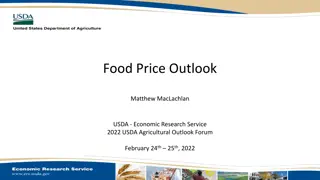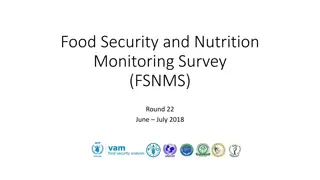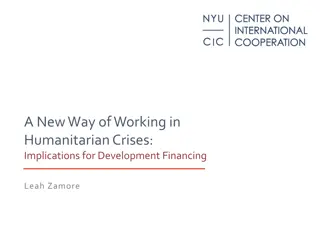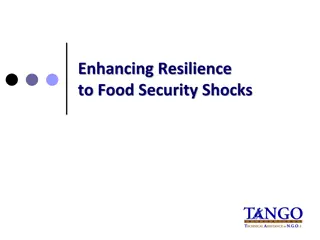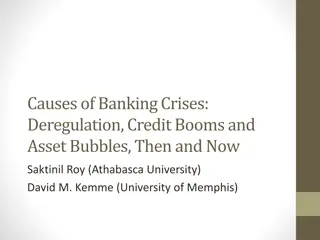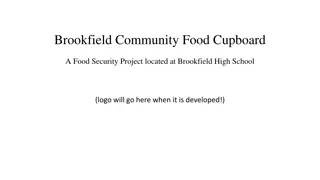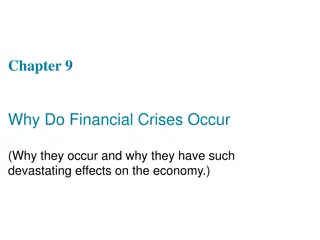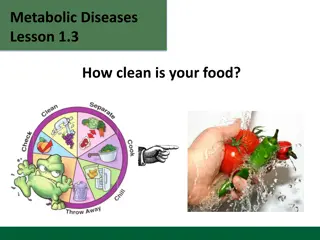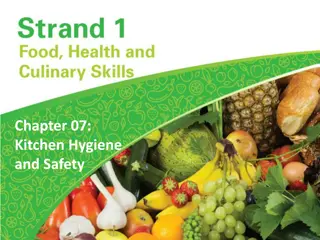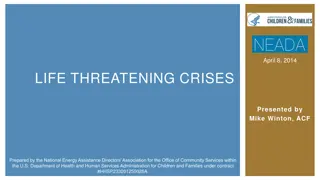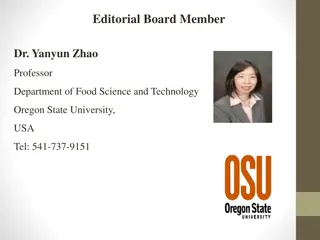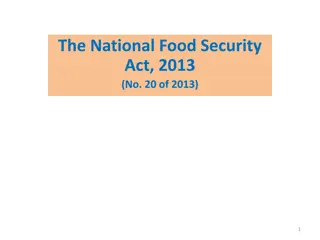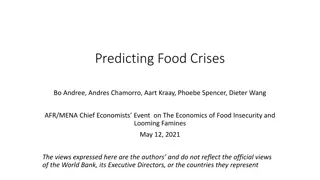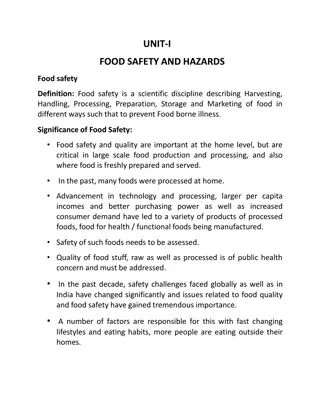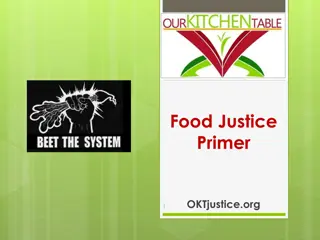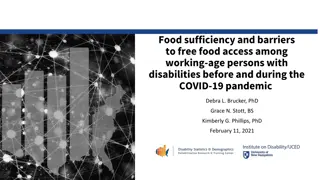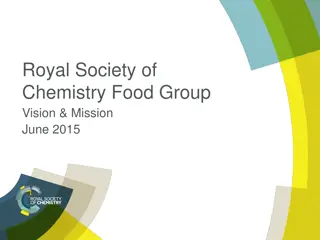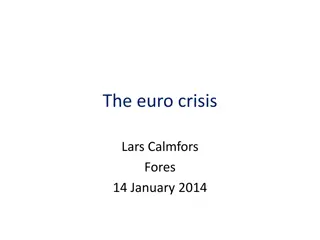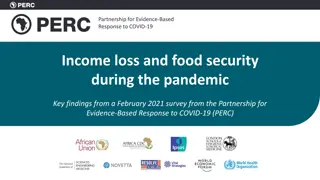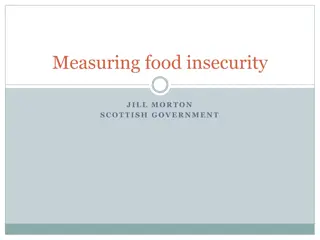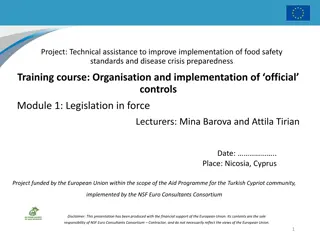BSc Food Science & Human Nutrition Programme Overview
This BSc Food Science & Human Nutrition programme at Maynooth University offers a comprehensive understanding of nutrition, biology, and chemistry as applied to food. With a focus on ingredients, production, products, and nutrition, students explore various aspects of food science including food saf
3 views • 12 slides
Comprehensive Guide to Food Safety and Preservation in Home Science
Explore the world of food safety and preservation through this detailed course in Home Science at Mahila Mahavidyalaya, Karad. The course covers topics like basics of food safety, principles of food preservation, methods of food preservation, and practical sessions on preparing various food items. G
1 views • 6 slides
Understanding Food Safety in Hospitality and Catering
Learners will explore food-related causes of ill health in hospitality and catering, including microbes and bacteria that can lead to food poisoning. Factors such as warmth, time, food supply, and moisture create ideal conditions for harmful bacteria to thrive and cause illness. This topic covers fo
5 views • 75 slides
Transforming School Food Education for Health and Wellbeing
The Food Education Roadmap aims to prioritize health and wellbeing through food for students, promoting a culture of healthy eating, wellness, and lifelong habits. It emphasizes access to healthy food, nutrition education, experiential learning, and community involvement. The initiative requires col
2 views • 12 slides
Role of Microorganisms in Food and Industry
Microorganisms play a crucial role in the food and industrial sectors, both benefiting and causing harm. They are involved in processes such as organic compound transformation, fermentation, and food production. While beneficial microorganisms contribute to the creation of various useful food produc
5 views • 44 slides
How are plant essential oils valuable as functional ingredients
Food Research Lab is one of the leading food industry consultants and offers various food production services. We provide food production and food manufacturing consultancy services to food, beverage and nutraceutical companies. Primary food production involves everything from food procurement, inve
8 views • 12 slides
Insights from Evaluation of Previous Humanitarian Crises and Core Humanitarian Standards
Evaluation of past crises reveals the importance of core humanitarian standards in providing timely, coordinated, and effective assistance. Learning from experience, feedback mechanisms, and competent staff are key for addressing humanitarian crises. Data and systems play a crucial role in monitorin
0 views • 13 slides
Overview of Food Price Trends and Consumer Expenditures in the US
The presentation highlights the consumer spending on food, food price trends over time, 2021 food prices, and forecasts for 2022 in a historical context. It emphasizes that U.S. consumers spent 12% of their expenditures on food in 2020, aligning with historical averages. Food price inflation remaine
0 views • 21 slides
Food Security and Nutrition Monitoring Survey Round 22 Trends
The Food Security and Nutrition Monitoring Survey (FSNMS) Round 22 conducted in June-July 2018 indicates a significant increase in the population in need of humanitarian assistance since August 2012. The survey outlines trends in household food security, food consumption groups, and objectives of FS
3 views • 9 slides
Food Equipment Usage Guidelines for Safe Food Handling
Enhance your knowledge on using equipment for making food with proper safety procedures. Learn about essential points like wearing protective gear, checking hot food temperatures, food safety principles, and sanitization requirements. Understand machine settings, food temperature checks, and serving
1 views • 22 slides
Management Strategies for Crisis in Tourism Industry
Explore the crucial role of crisis management in the tourism sector, understanding how internal and external shocks impact the industry. Discover the ripple effects of crises on a global scale and delve into various approaches to studying and managing crises effectively. Gain insights into the lifec
0 views • 9 slides
Innovative Approaches in Humanitarian Crises and Development Financing
This study explores the New Way of Working in humanitarian crises, focusing on reinforcing national systems, anticipating crises, and transcending humanitarian-development divides. Promising trends include rising government ownership and increased linkages between humanitarian activities and governm
0 views • 6 slides
National Food Reserve Agency (NFRA): Enhancing Food Security in Nigeria
The National Food Reserve Agency (NFRA) under the Federal Ministry of Agriculture & Water Resources plays a crucial role in addressing agricultural production, storage, and marketing challenges in Nigeria. With a vision to ensure sustainable food access for all Nigerians and become a global food pro
1 views • 30 slides
Best Practices for Food Preparation to Ensure Food Safety
This chapter highlights essential practices for prepping food to prevent cross-contamination and time-temperature abuse in a food service setting. Topics covered include safe methods for thawing food, cooking temperatures, microwave cooking, informing consumers of risks, requirements for partially c
1 views • 25 slides
Understanding Resilience in Food Security Shocks
Resilience in the context of food security shocks involves the ability of individuals, households, communities, and systems to bounce back and recover from various stressors. This resilience is crucial in regions facing continuous crises like the Horn of Africa and the Sahel, where factors beyond we
1 views • 21 slides
Exploring Food Science and Technology in Modern Society
Delve into the world of food science and technology with insights on what scientists do, the importance of understanding food, definitions of food science and food technology, factors affecting food spoilage, and traditional and modern food processing technologies. Gain knowledge on testing hypothes
0 views • 22 slides
Food Safety Practices in Service Industry
This chapter focuses on the essential food safety practices in the service industry, covering topics such as time and temperature requirements for holding food, ways to prevent time-temperature abuse and cross-contamination, minimizing bare-hand contact with food, preventing staff and customers from
0 views • 26 slides
Analysis of Banking Crises: Deregulation, Credit Booms, and Global Impacts
This study delves into the causes and patterns of banking crises, focusing on deregulation, credit booms, and asset bubbles. It compares the global financial crisis of 2008-2009 with historical crises worldwide, highlighting common factors leading to such events. The research discusses the role of l
0 views • 23 slides
Brookfield Community Food Cupboard: Addressing Food Insecurity at Brookfield High School
Brookfield Community Food Cupboard is a project aiming to provide food security to individuals and families in the Riverside Park/Hunt Club area, including students and families served by Brookfield High School. The initiative seeks to supplement existing food security programs by offering a day's w
0 views • 11 slides
Understanding Financial Crises and Their Impacts
Financial crises arise due to disruptions in financial markets, leading to severe economic consequences. This text delves into the definition, stages, causes, and effects of financial crises, with a focus on the global financial crisis of 2007-2009 and the European Sovereign Debt Crisis. It also dis
0 views • 28 slides
Food Safety and Preventing Food-borne Illness
This lesson focuses on the importance of food safety, addressing how clean our food is and at what points safety can be compromised. It delves into common types of microbes that contaminate foods and explores ways in which food safety can be compromised. The activity involves case studies on food sa
0 views • 11 slides
Mastering Good Food Hygiene and Storage Practices
Understanding food spoilage causes, common food-poisoning bacteria, conditions for bacterial growth, ways to prevent food contamination, safe food handling practices, HACCP concept, types of perishable foods, importance of proper food storage, packaging materials for food, and recognizing signs of f
1 views • 27 slides
Gender Equality in Humanitarian Crises: Empowering Women and Girls
Addressing gender equality in humanitarian crises is crucial for empowering women and girls. Access and participation in facilities and activities, meaningful participation, dignity, and empowerment are key aspects to consider. Women's empowerment spans various spheres and requires holistic approach
0 views • 33 slides
Understanding Kitchen Hygiene and Food Safety
Kitchen hygiene and food safety are crucial to prevent food spoilage and food poisoning. Factors like enzymes, micro-organisms, and oxygen can lead to food spoilage, while food poisoning occurs when pathogenic bacteria multiply in consumed food. Practicing proper hygiene, storage, and preparation me
0 views • 27 slides
Managing Life-Threatening Crises in Energy Assistance Programs
This document outlines statutory requirements, intervention concepts, crisis components, definitions of crisis and life-threatening crises, and the process of applying for crisis assistance in energy-related emergencies. Grantees must act promptly to resolve crises within specific timeframes, ensuri
0 views • 17 slides
Dr. Yanyun Zhao - Food Science & Technology Professor at Oregon State University
Dr. Yanyun Zhao is a prominent Professor at Oregon State University specializing in food science and technology. With a strong research focus on food processing technologies and food safety, Dr. Zhao has made significant contributions to the field. Her expertise in value-added food processing, antim
0 views • 16 slides
National Food Security Act, 2013 Overview
The National Food Security Act, 2013 (NFSA) aims to ensure food and nutritional security for all by providing access to adequate quality food at affordable prices. It includes provisions for hot cooked meals, food security allowance, social audit, nutritional support for children, and various monito
0 views • 15 slides
Predicting Food Crises: A Comprehensive Analysis
Food insecurity is a significant issue, especially in developing regions like Africa, exacerbated by factors such as climate change and population growth. Despite the importance of early prevention, there is limited literature on predicting food crises, unlike conflict outbreaks. This study by Bo An
0 views • 15 slides
Importance of Food Safety in Modern Food Production
Food safety is crucial in modern food production to prevent foodborne illnesses. With advancements in technology and increased demand for processed foods, the need to ensure the safety and quality of food has become paramount. Factors affecting food safety include poor hygiene practices, contaminate
0 views • 30 slides
Understanding Food Justice and Insecurity: A Comprehensive Overview
Food Justice Primer provides insightful definitions and discussions on key concepts such as food justice, food insecurity, food sovereignty, and food deserts. It highlights the need for equitable sharing of benefits and risks in the food system, aiming to transform current disparities and inequities
0 views • 49 slides
Food Sufficiency and Barriers to Free Food Access Among Working-Age Persons with Disabilities Before and During COVID-19 Pandemic
Working-age persons with disabilities face economic vulnerability and higher chances of living in food-insecure households. This study explores food sufficiency and barriers to accessing free food during the COVID-19 pandemic. Data was collected through an online survey, revealing insights into food
1 views • 14 slides
Impact of Banking Crises on the Real Economy: Lessons from History
Understanding the influence of banking crises on the real economy, particularly during the Great Depression, where massive bank suspensions triggered economic turmoil. The interplay between banking panics, monetary deflation, bank failures, loss of credit information, and debt deflation worsened the
0 views • 55 slides
Royal Society of Chemistry Food Group Vision & Mission Summary
The Royal Society of Chemistry Food Group aims to lead, promote, and disseminate the understanding and importance of chemistry in food. Their vision is to enhance food and nutrition security through advancing the chemistry of food ingredients. They strive to engage with various communities to promot
0 views • 4 slides
Cuba and Venezuela: Contemporary Crises Analysis
Analyzing the contemporary crises in Cuba and Venezuela, this study delves into the deep-rooted issues affecting both countries. From economic struggles to demographic challenges and political alliances, the research highlights the key factors contributing to the crises. Despite attempts at reforms
0 views • 35 slides
Understanding the Euro Crisis: Interrelated Challenges and Strategies
The Euro crisis, analyzed through government bond yields, interrelated crises (sovereign debt, bank, growth, and competitiveness crises), government debt dynamics, and strategies to tackle sovereign debt crises with rescue loans and fiscal austerity conditions. The interconnected nature of the crise
0 views • 20 slides
Impact of COVID-19 on Income Loss and Food Security: Key Findings from a February 2021 Survey by PERC
The presentation highlights the impact of COVID-19 on income loss and food security, emphasizing the challenges faced by vulnerable populations. Key findings indicate pervasive income loss and barriers to accessing food, with social protection programs falling short in meeting needs. The report stre
0 views • 36 slides
Understanding Food Insecurity Measurement in Scotland
The report emphasizes the importance of understanding and addressing food insecurity effectively in Scotland. It discusses the dignity in ending hunger, the rights to nutritious food, and the limitations of emergency food aid. The Food Insecurity Experience Scale is highlighted as a tool for measuri
0 views • 7 slides
Analysis of Banking Losses During Crises: Charts in Staff Memo 3/2014
This collection of charts depicts the losses incurred by banks during crises in various sectors such as households, building, construction, and non-financial enterprises in different countries like Norway, the United Kingdom, and Iceland over different time periods. The data includes write-downs and
0 views • 11 slides
Enhancing Food Safety Standards and Legal Compliance in Food Chain Operations
This project focuses on improving the implementation of food safety standards and preparedness for disease crises through training courses on official control procedures and legislation in force, funded by the European Union. The content discusses key regulations, legal perspectives, and responsibil
0 views • 40 slides
Understanding Food Costing and Pricing in the Food Industry
Explore the factors influencing food costs in the restaurant industry, including the importance of food cost percentage, pricing strategies, and impact of location on food prices. Learn about managing food costs, controlling waste, and optimizing profitability through effective cost analysis and men
0 views • 12 slides

